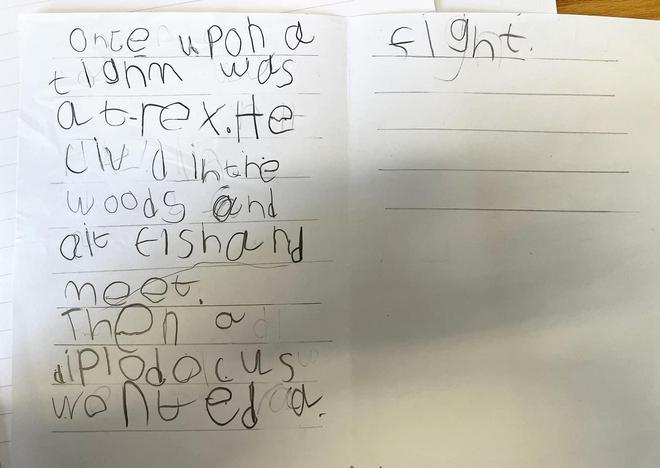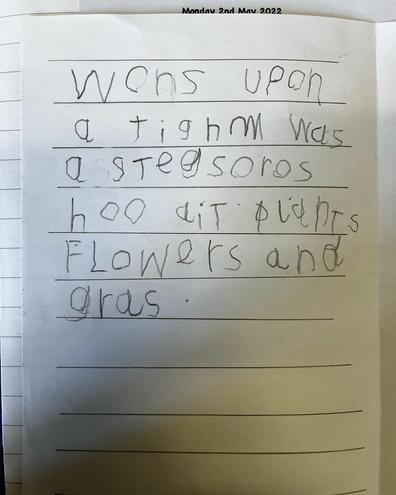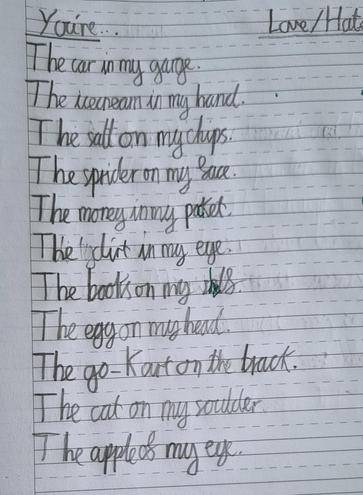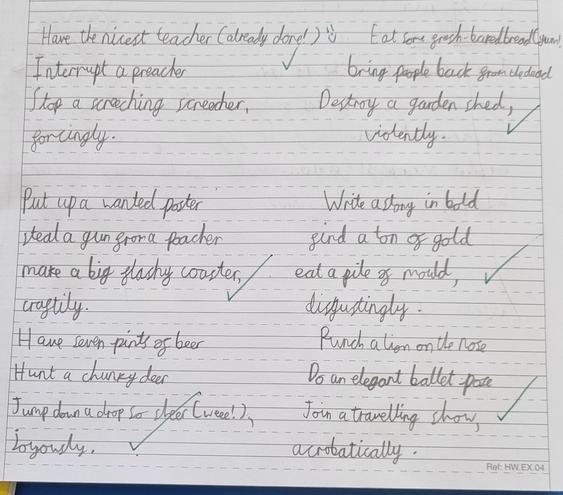Writing
From our youngest writers to our oldest writers
|
|
|
|
|
|
Intent
A writer leaving Rowsley CofE Primary will develop a love of writing, through purposeful, exciting and engaging stimuli and be able to articulate and communicate their own creative ideas for a reader. They will have the opportunity to gain understanding of different genres by planning, orally rehearsing, drafting, proof-reading, editing, improving and publishing their composition. They will write purposefully for different audiences and develop a wide vocabulary. They will use different strategies for learning to spell and use punctuation and grammar correctly.
Implementation
Writing is a key priority at Rowsley CofE Primary School. As a school, our aim is to develop a love of writing, through purposeful, exciting and engaging stimuli. These allow children to learn key writing skills, develop their vocabulary and embed their spelling, punctuation and grammar. Children have the opportunity to write a wide genre of text types and are encouraged to plan, orally rehearse, write, reflect and improve their writing. We engage our children in their writing through out focus on a range of carefully selected narrative, non-fiction and poetry stimulus for writing.
These stimuli form the focus to a half term writing sequence for EYFS, Key Stage 1 and Key Stage 2. The stimuli may be novels associated to the topic, engaging picture books – used from EYFS to Year 6, film, narration, visits, historical sources, internet research.
All initial stimuli is carefully chosen with the idea to immerse the children in the text through drama, art, music and real-life experiences. We analyse and explore the features of the stimulus and the choices the creator/author has made to make it successful. From this we build on their style. The children are then taught the skills needed to be able to use this style to influence their own writing.
The children then begin to plan their own piece of writing before becoming authors and using their plan to write. They have the opportunity to correct spellings, improve their vocabulary choices or up-level their sentences during the editing stage. During the editing stage each child receives feedback on their successes and development points. Children are given time to redraft their work by adding in anything from previous editing and improvement sessions. Finally, the children publish their writing in a final draft. This final draft is written in a special writing book.
To celebrate their writing efforts, a special Writers Toolkit is awarded every Friday in our celebration Collective Worship where one writer is chosen from across the school and their work is shared with everyone.
Children are also given the opportunity to share and celebrate their writing with other children and teachers in school. For example Year 5/6 will share with Y3/4 so they can see the progression that is required when they enter UKS2.
Writing lessons take place 4 days per week in every classroom.
A hugely important aspect of writing is spelling, punctuation and grammar. One session a week is fully focused on grammar and the children complete grammar activities twice a week in their morning session as they come into school.
Children are taught spelling rules through a set of discrete spelling lessons throughout the week.
At Rowsley CofE we use Spelling Shed to support our spelling. We have seen great improvement in our engagement since introducing Spelling Shed. EYFS and Key Stage 1 focus on learning to spell key words using the phonics learned in the week.
Spelling, Punctuation and Grammar
The teaching of grammar is weaved into the writing sequence. All staff use our bespoke grammar progression document to guide their planning. Upper key stage two also have discrete grammar sessions which reinforce and consolidate the children’s prior learning.
Children are taught spelling rules through a set of discrete spelling lessons throughout the week. Vocabulary Ninja and the Spelling Shed are used to guide teachers planning. These programmes follow a teaching sequence for spelling, whereby each new concept is taught, practised and then applied and assessed. There is a weekly spelling test in the KS2 classes and Spelling is sent home every week as homework. In addition, teaching will promote the learning of spellings including common exceptions and personal spellings, they will also ensure children learn the set spellings for their year group.
FS and Key Stage one focus on learning to spell key words.
Spelling prompts are found in the front of each English book.





